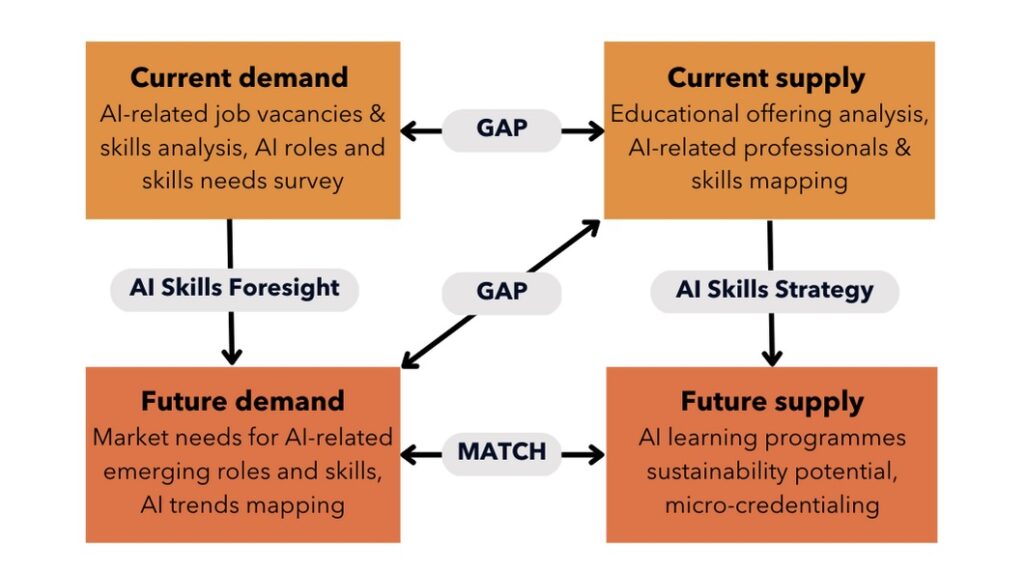
 Back
Back
Towards a well-rounded AI Skills Strategy for Europe

We are finalising the AI Skills Needs Analysis (to be released in early 2023) — a stepping stone to building a coherent and well-rounded strategy for AI skills development in the EU. The Needs Analysis helps to identify the critical skills gap between the market needs and the educational offerings.
Developing a framework for an AI Skills Strategy
Having a complete overview of the supply and demand levels of AI skills in EU countries is essential to develop solutions to bridge the current and emerging skills gap. What kind of AI knowledge and skills does the market need to seize new business opportunities? What do people need to understand about AI to be able to use this technology in business and policy contexts? How can we ensure that privacy, bias, and trust are at the centre of AI-based solutions?
At this stage, we are examining data collected from companies, policymakers, learning providers, and educational institutions. The multifaced analysis will provide skills intelligence insights into the current and future workforce requirements for AI-related professions.
Upskilling and reskilling priorities for “near-AI” talents
While analysing the input gathered, a particular emphasis is put on “near-AI” talents. “Near-AI” talents are professionals and prospects who can rapidly take up AI-related roles, with limited efforts in training or education. The “near-AI” talents have the potential to double the current size of the AI-related workforce in the EU.
To attract “near-AI” talents into the field of AI, it is important to explain the possibility of a fast transition into an AI-related role. It is possible thanks to short-term learning programmes, as well as micro-credentials. The recognition of learning outcomes of short-term programmes can accelerate the transition of professionals and prospects into a new role, thus facilitating the upskilling or reskilling of individuals.
An overview of the AI Skills Needs Analysis

The AI Skills Needs Analysis has five constitutive elements:
- Four occupational domains. Policymakers, Business Leaders, Technology Leaders, and Technology Practitioners are the starting point. Under those domains, we look at current and emerging professional roles that are relevant to ARISA. We used ESCO classification (ISCO-08) as a common denominator to map and identify ARISA-relevant occupations.
- Current demand for AI roles. The current demand for AI-related professionals and the most needed skills for these role profiles are studied by reviewing academic publications, the AI educational offerings, the available AI-related (online) job vacancies, and surveying key stakeholders. Around 413 respondents filled out the questionnaire and provided valuable data on their need for AI roles and skills. Having conducted an analysis of online job vacancies in the EU member countries, we captured the most sought skills for each role under the four initial occupational domains. Each role has a specific set of skills, but there are competencies needed across all domains. The AI Skills Needs Analysis will also provide an overview of universal skills that appeared in most of the analysed online job vacancies.
- Future demand for AI roles. ARISA experts not only assess the current needs but also create a prognosis for the future, indicating the roles that are most likely to gain traction in the coming years. For each of the roles, they identify specific skills. A group of international experts identified the AI market trends based on the input collected in focus groups from 16 EU countries.
- Current supply of AI skills. The analysis of the educational offering in the field of AI (with desk and academic research) helps assess the status of the current supply of AI skills and identify potential gaps. Experts compare the learning programmes to determine their sustainability potential in addressing the skills needs of each occupational domain. This also helps identify how micro-credentialing can contribute to reducing skills deficiencies in the short term.
- AI skills gap analysis. The Needs Analysis aims to demonstrate the gap between present and future demand for AI skills, as well as the current supply. Conclusions on the AI skills gap are essential to formulate a well-rounded AI Skills Strategy for Europe.
Other interesting news

Shaping the Future: Unveiling the AI Skills Strategy for Europe
17 January 2024
The ARISA AI Skills Strategy for Europe addresses the key challenges such as bridging the skills gaps, and paves the way for a comprehensive, adaptive, and inclusive AI education landscape.

ARISA Newsletter: November 2023
30 November 2023
Do you want to get involved in the ARISA project? Become our Associated Partner and help us share the future of AI skills in Europe!

ARISA Newsletter: May 2024
27 May 2024
ARISA Newsletter: May 2024